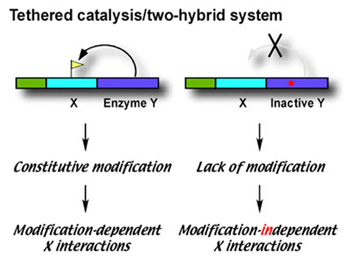Research: Project 2
Post-translational modifications and protein functions.
 Post-translational modifications (PTM) are chemical changes made to proteins after
they are synthesized. PTMs may alter the underlying protein's structure, function,
and ability to interact with other proteins, metabolites, or biomolecules. Thus, the
repertoire of proteome expands drastically when PTMs are considered. In fact, PTMs
are essential and integral components of comprehensive proteomes.
Post-translational modifications (PTM) are chemical changes made to proteins after
they are synthesized. PTMs may alter the underlying protein's structure, function,
and ability to interact with other proteins, metabolites, or biomolecules. Thus, the
repertoire of proteome expands drastically when PTMs are considered. In fact, PTMs
are essential and integral components of comprehensive proteomes.
A. In the Tumor suppressor p53 project, we combine biochemical and molecular biology approaches to studying how the structure and the transcriptional regulator functions of a tumor suppressor protein p53 is modulated by PTMs, including acetylation at its carboxyl terminus, as well as by phosphorylation at both the amino and the carboxyl termini. We hope to obtain a biochemical understanding on how p53 modifications may be linked to suppressing tumorigenesis.
B. We also are interested in other PTM-related functions. Continuing our interest in devising biotechnological tools for PTM research (e.g. the Tethered Catalysis/Yeast Two-Hybrid system, TC/Y2H, patented), we are developing a novel system by which we can obtain quantitatively modified proteins for in vitro biochemical studies. In addition to its biotechnological applications, we will use this system.